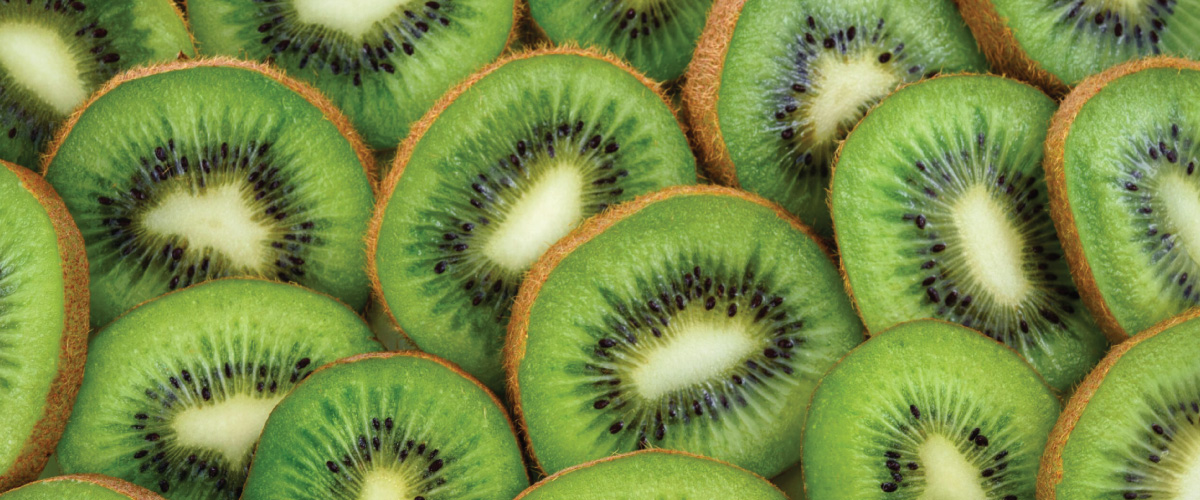Imagine biting into a vibrant green fruit, its sweet and tangy flavour bursting in your mouth, while it quietly works wonders for your health. Green Kiwi fruit, often overlooked in favour of flashier superfoods, is a nutritional powerhouse packed with vitamins, antioxidants, and fibre. But what makes this little fruit so special? As we dive into the remarkable health benefits of kiwi, you’ll discover why it deserves a prominent place on your plate. From boosting your immune system to supporting digestive health, kiwi is more than just a tasty treat , it can be a key player in your wellness journey.
Breakdown of its nutritional content :
Nutritional Content (per 100g of raw Kiwi fruit):
| NUTRITION | CONTENT |
| Calories | 61 kcal |
| Carbohydrates | 14.7 g |
| Sugars | 8.99 g |
| Dietary Fibre | 3.0 g |
| Protein | 0.99 g |
| Fat | 0.5 g |
| Vitamin C | 92.7 mg |
| Vitamin E | 1.46 mg |
| Vitamin K | 40.3 µg |
| Folate | 31 µg |
| Potassium | 301 mg |
| Magnesium | 17 mg |
| Calcium | 34 mg |
| Iron | 0.41 mg |
*Antioxidants*: Kiwi also contains various antioxidants, including carotenoids and polyphenols.
Health benefits of Green Kiwi
1. Boosts Immune System:
Green Kiwi fruit is rich in Vitamin C, which is essential for a well-functioning immune system. It helps white blood cells (like neutrophils) in fighting infections, reducing the severity and duration of common cold symptoms.
2. High Antioxidant Properties and Collagen Production:
Vitamin C in Green Kiwi fruit acts as a powerful antioxidant, neutralising free radicals and protecting cells from oxidative stress, which can damage DNA, lipids, and proteins, additionally Vitamin C supports collagen formation, which is essential for the health of skin, blood vessels, bones, cartilage, gums, and teeth. This helps maintain the structural integrity of tissues.
3. Improves Iron Absorption:
Consuming Green Kiwi fruit along with iron-rich foods enhances iron absorption, especially for individuals with low iron levels. This can help prevent or treat iron deficiency anaemia.
4. Supports Energy and Reduces Fatigue:
Green Kiwi fruit contributes to energy production and helps reduce tiredness and fatigue. This is likely due to its role in the synthesis of important biomolecules like dopamine and neurotransmitters.
5. Maintains Healthy Skin:
The high Vitamin C content helps protect skin from damage caused by free radicals and supports the production of collagen, contributing to healthier, more youthful-looking skin.
6. Fight oxidative stress:
Green Kiwi fruit, both green and gold varieties, contain vitamin E in the form of α-tocopherol, which is easily absorbed by the body. They also have δ-tocomonoenol, another form of vitamin E, known for its strong antioxidant effects. Eating kiwi fruit can raise vitamin E levels in the blood, helping to fight oxidative stress and support overall health.
7. Pregnancy:
Green Kiwi fruit is rich in folate. Folate is crucial for healthy cell growth and is especially important during pregnancy to support foetal development. Fresh kiwi fruit also preserves folate better than cooked vegetables, making it a great addition to the diet for meeting daily folate needs.
9. Blood Pressure Control:
Green and gold Kiwi fruit are excellent sources of potassium. Potassium helps regulate blood pressure, and diets high in potassium can lower blood pressure, particularly in people with hypertension. The low sodium-to-potassium ratio in Green Kiwi fruit further supports heart health.
10. Digestive Health :
Green Kiwi fruit is rich in dietary fibre, which improves bowel movements, stool consistency, and gut health. Green Kiwi fruit has more fibre than gold varieties, and its unique combination of soluble and insoluble fibre promotes a healthy gut by aiding fermentation and increasing the production of short-chain fatty acids.
11. Blood Sugar Control:
Despite its natural sugars, Green Kiwi fruit has a low glycemic index — making it a good choice for managing blood sugar levels. Its balanced mix of fructose and glucose helps prevent digestive discomfort and keeps post-meal blood sugar levels stable, supporting overall metabolic health.
12. Cellular Health:
Green Kiwi fruit is packed with antioxidants like vitamins C and E, carotenoids, and phenolic compounds. These antioxidants protect cells from damage caused by free radicals, potentially lowering the risk of chronic diseases like heart disease. Although more research is needed, these compounds are believed to reduce oxidative stress and inflammation, promoting healthy cells.
13. Heart Health:
Thanks to its high antioxidant content, Green Kiwi fruit may improve heart health by reducing oxidative stress and improving cholesterol levels. Its potassium content also supports healthy blood pressure.
14. Digestive Health :
The enzyme *actinidin*, abundant in green Green Kiwi fruit, plays a vital role in aiding protein digestion in both the stomach and small intestine. Green Kiwi fruit’s combination of soluble and insoluble fibres improves bowel movements and reduces constipation. Regular consumption increases stool frequency and helps maintain abdominal comfort. Additionally, *kiwellin*, another protein in Green Kiwi fruit, contributes to reducing gastrointestinal discomfort and inflammation.
15. Metabolic Health :
Kiwi Fruits low glycemic index and fibre content make it suitable for managing glucose levels, particularly in people with diabetes or glucose intolerance. It can reduce high blood sugar after eating and improve lipid profiles, increasing HDL (\”good\” cholesterol) and decreasing LDL (\”bad\” cholesterol).
Benefits of Kiwi in dengue
Green Kiwi fruit can play a supportive role in recovery from dengue due to its rich nutritional profile. Its high vitamin C content boosts the immune system, aiding the body in fighting infections and speeding up recovery. Additionally, Green Kiwi fruit has a high water content, which helps maintain hydration—crucial for dengue patients who may face dehydration. The antioxidants present in Green Kiwi fruit help reduce oxidative stress and inflammation, further supporting overall health during recovery. Furthermore, Green Kiwi fruit enhances the absorption of iron from other foods, which is essential for replenishing blood levels after dengue. Its fibre content also promotes gut health, aiding in nutrient absorption and overall recovery. Incorporating Green Kiwi fruit into the diet can provide a tasty and beneficial way to support the body’s healing process during dengue recovery, although it’s important to follow medical advice and maintain a balanced diet.
You should consider avoiding Green Kiwi fruit in the following situations
-
Exotic Fruits
Kiwi Green (Chile) – 3pc
₹152.00Original price was: ₹152.00.₹106.00Current price is: ₹106.00.
1. Allergies: If you have a known allergy to Green Kiwi fruit or related fruits (like latex, bananas, or avocados), it’s best to avoid it to prevent allergic reactions.
2. Gastrointestinal Issues: If you have certain digestive disorders, such as irritable bowel syndrome (IBS), Green Kiwi fruit’s fibre content may cause discomfort or bloating.
3. Medication Interactions: Green Kiwi fruit can affect blood-thinning medications due to its high vitamin K content. If you’re on anticoagulants, consult your doctor before consuming it.
4. Surgery: If you\’re scheduled for surgery, it\’s advisable to avoid Green Kiwi fruit in the days leading up to the procedure, as it can affect blood clotting.
Myths and Facts about Kiwi
Myth : Eating kiwi can cause allergic reactions in everyone.
Fact: While kiwi can trigger allergies in some individuals, not everyone is affected. Many people enjoy kiwi without any adverse reactions.
Myth : Green Kiwi fruit should be eaten only when fully ripe.
Fact: Green Kiwi fruit can be enjoyed at various stages of ripeness. While fully ripe fruit is softer and sweeter, slightly under ripe kiwis can add a tart flavour to dishes.
Myth : Eating kiwi can help prevent colds.
Fact: It does not guarantee prevention , but the high vitamin C content in kiwi can boost the immune system, potentially reducing the duration and severity of colds.
Myth : All Green Kiwi fruits are the Same
Fact: There are several varieties of Green Kiwi fruit, including green and gold, each with its own flavour profile, nutritional content, and texture.
For example:
1.Hayward Kiwi ( Green kiwi) : The most common variety, known for its fuzzy brown skin and bright green flesh with a sweet-tart flavour.
2.Golden Kiwi: Has smooth, bronze skin with yellow flesh. It’s sweeter and less tangy than the green kiwi.
3.Hardy Kiwi: A smaller, smooth-skinned variety that can be eaten whole. It has a mild, sweet taste.
4.Baby Kiwi (Kiwiberry): Similar to Hardy Kiwi but even smaller, about the size of a grape. It’s smooth-skinned and sweet.
5.Red Kiwi: Known for its striking red ring around the centre. It has a sweeter and slightly tangier flavour.
6.Jintao Kiwi: A golden variety, similar to the Golden Kiwi but typically sweeter and with a juicier texture.
7.Bruno Kiwi: Has a slightly darker, reddish-brown skin and a more intense tart flavour compared to Hayward.
8.Abbot Kiwi: Features oval-shaped fruit with a sweeter flavour, ideal for those who prefer a less tangy taste.
Myth : Green Kiwi fruit Should Be Avoided During Pregnancy
Fact: Green Kiwi fruit is rich in essential nutrients like vitamin C and folate, making it a healthy option for pregnant individuals when consumed in moderation.
Myth : You Can Only Eat the Flesh
Fact: The skin of Green Kiwi fruit is edible and contains additional nutrients, including fibre. Some people choose to eat it for extra health benefits.
Myth : Green Kiwi fruit is a Seasonal Fruit
Fact: Green Kiwi fruit is available year-round in many places due to global sourcing and storage methods, allowing for consistent consumption.
Key Takeaways
Now don\’t you think you have enough reason to consider adding this nutrient-dense fruit to your meals or snacks. Green Kiwi fruit is a powerhouse of essential vitamins and minerals, particularly high in Vitamin C, Vitamin E, folate, and potassium. It not only boosts your immune system but also offers powerful antioxidants that protect cellular health and may lower chronic disease risks. Additionally, its fibre content promotes digestive health and helps regulate blood pressure and cholesterol levels, supporting heart health. For those recovering from dengue, Green Kiwi fruit can aid in immune support and iron absorption. However, be mindful of allergies, gastrointestinal issues, and potential medication interactions when enjoying this delicious fruit. Incorporating Green Kiwi fruit can enhance your overall wellness while adding a tasty twist to your diet.
-
Exotic Fruits
Kiwi Green (Chile) – 3pc
₹152.00Original price was: ₹152.00.₹106.00Current price is: ₹106.00.



